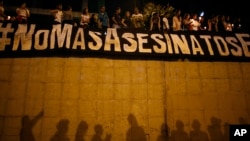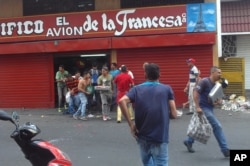Venezuela's government has tallied nearly 10,000 violent deaths nationwide this year through mid-August, a grim figure some observers contend is a serious undercount.
The Venezuelan Security Observatory, part of the federal Ministry of the Interior, Justice and Peace, recorded 9,927 homicides from January 1 through August 13, it said in a report released Monday.
Opposition lawmaker Simón Calzadilla expressed skepticism, citing figures from the nongovernmental Venezuelan Violence Observatory group that show Venezuela's homicide rate has been increasing in recent years. It reported 27,875 violent deaths in 2015 and 28,468 in 2016.
"And this year it seems that we are going to break all the records," Calzadilla said at a Tuesday news conference, predicting the homicide count could top 33,000.
Why the wildly disparate numbers? In part, it's because Venezuela's government does not include extrajudicial killings in its homicide totals, though human rights group do, two experts with the Brazilian think tank Igarapé Institute wrote in the Los Angeles Times earlier this year.
The institute tracks homicides globally.
UN finds policy to curb dissent
The Venezuelan government said its current toll excludes deaths linked to mass street demonstrations for and against President Nicolas Maduro's government that began in early April. Its attorney general's office is investigating 124 such deaths.
On Wednesday, the United Nations human rights office released a report suggesting that Venezuelan security forces were tied to 46 of those deaths and pro-government armed groups, or colectivos, to another 27.
"Responsibility for the remaining 51 deaths has not yet been determined," the United Nations said in a news release on its report, which found "the existence of a policy to repress political dissent and instill fear in the population to curb demonstrations."
Upon the government report's release, Interior Minister Nestor Reverol said Venezuelan authorities were working to reduce violence. More than 9,000 uniformed security forces have been deployed nationwide, he said on social media, to improve public safety and to "defend the sovereignty and independence of the country."
Fear about security stalks many of the South American country's 31 million residents. Only 12 percent of Venezuelans reported feeling safe, according to Gallup's Law and Order Index. The results, released in August, show the South American country was considered the least secure among 135 countries in the ranking.
Gallup said almost four out of 10 Venezuelans 38 percent had had money or property stolen last year. At least one out of five 22 percent reported being assaulted or mugged. Venezuela was the only Latin American country to have at least 15 percent of respondents claim they were assaulted or mugged in 2016.
Fright prompts flight
Growing insecurity has prompted countless Venezuelans to flee the country.
Pedro Zerpa, interviewed on Caracas' Sabana Grande pedestrian thoroughfare, said his college-student son left for Chile two years ago after being "robbed at the door of the house" by pistol-wielding men.
The 56-year-old shoe repair specialist said his son completed his economics studies in Chile and had found work there.
Amelis Durán, interviewed in east Caracas' Chacaito neighborhood, said her two grown sons and daughter also had moved abroad.
"They had to migrate from the country," the woman said, declining to give their destinations."They left too much insecurity in any part of Caracas."
The government report attributed most homicides to firearms, used in 92 percent of all cases.
Carol Guensburg contributed to this report.






